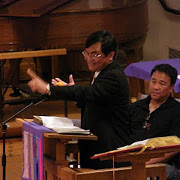 |
| (Images courtesy of Baptist Press) |
In the last four months alone, Open Doors USA, which closely monitors the persecuted church, says over 30 churches have been attacked by Buddhist extremists attempting to maintain Sri Lanka's Buddhist heritage.
We spoke via Skype with a Christian leader working with Asian Access in Sri Lanka who confirms the reports. For security reasons, we'll call him Brother Amos. "Large numbers of churches have been attacked, and many people think--when it comes to violence--it is the Muslims who can be violent against Christians. But that is not true, in our experience, in this part of the world. The Buddhists can also be extremely violent."
Why the spike in trouble from Buddhists? Violence seems to go against all their principles. Brother Amos explains, "With the Church beginning to grow, they feel very insecure. Their economy is hurting because people are turning to Christ. As a result of that, they [Buddhists] have turned against the churches, and that is their belief that by violence and by persecution, they can cause the growth of the church to be stopped."
How is economy tied into this problem? The growth of the church means that people who used to go to Buddhist temples are no longer doing so. "The income that came to the temple from these believers of Buddhism has now been diverted to the Church. Some of the temples in rural areas are finding it difficult to survive because people are leaving Buddhism."
There's a political angle, too. "Our constitution says that every religion has freedom of worship and expression and to propagate their faith," explains Brother Amos. However, "70% of our people are Buddhist. So the government is aware that if they go against Buddhism, they will be thrown out of power very soon." The government turns a blind eye to the attacks in order to appease the majority Buddhists, he adds.
Some churches have taken legal action and received favorable decisions, but is this a development in the right direction? On one hand, it's an accountability question. On the other, the challenge of persecution puts the relevance of the body of Christ into play. Brother Amos says, "Our mandate is to develop leaders who become relevant to the soil and relevant to the nations. Part of being relevant to our nation now is to be able to face persecution. In the midst of persecution, one of the key factors has been helping our people to know that God still reigns and God is seated on the Throne."
Asian Access invests in leadership training for the future. "Our investment has been picking the best in the country, providing them with the best training and presenting them with the best models so that they can be the catalyst in the growth of the Church."
It's likely the backlash won't be easing up soon. "My gut level feeling is that it will continue and it will intensify until and unless the international community will bring pressure on the government," Amos says, confirming that extremists will do whatever it takes to keep Sri Lanka a Buddhist nation. What it boils down to is the fight for the soul of a nation. "The God of this world has blinded the eyes of the people. Our direct enemy is not the human beings who are attacking us, but our direct enemy is the Evil One who causes people to do things against the Church of God."
Will you pray with the believers in Sri Lanka? They're asking prayer for wisdom for the Christian leaders, strength to endure hardship, and boldness to share the hope of Christ regardless.

